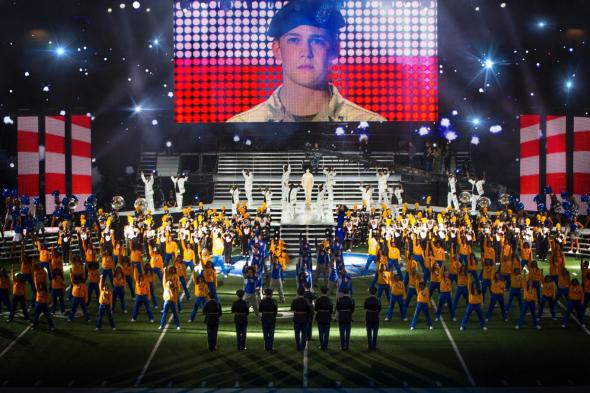The trailer for Ang Lee’s adaptation of Billy Lynn’s Long Halftime Walk premiered on Thursday, and it contains hints that Lee may have deeply misunderstood what was so wonderful and distinctive about Ben Fountain’s book. The novel is about a squad of Iraq War veterans who have just exhibited military valor abroad and have been brought home to be honored at a Dallas Cowboys halftime show before being shipped back to the front. It captures their camaraderie, excess, and delight during this brief leave and their bewilderment at an America that lionizes them and ignores them in equal measure.
Here is what concerns me about the trailer:
- Theme: The book is a gimlet-eyed, quite cynical look at how we exploit powerless young men as cannon fodder and dismiss their experiences as veterans even as we valorize them as symbols of America, freedom, courage, sacrifice, etc. This trailer hints at this theme—Billy Lynn appears overwhelmed and vulnerable during a halftime extravaganza—but it also valorizes images of veterans as symbols of America, freedom, courage, sacrifice, etc. The phrases courage and the human spirit appear in titles on screen.
- Tone: The book is sprightly and dark. It deposits you in the mind of a very young man who is thrilled to be back in America—away from artillery and with access to women, football, and booze—and whose alienation and disaffection emerge subtly, over time, as the undertow of what feels on the surface like a sparkling, one-crazy-night caper. The trailer’s tone is measured and gloopy, underscored with subdued choral musings about heroes (courtesy of David Bowie’s “Heroes,” in the latest instance of the movie trailer cliché of using slowed-down choral covers of pop songs).
- Obtuseness: One recurring conceit of the book is that Billy Lynn and his squad have been befriended by an opportunistic agent who is trying to sell their story to Hollywood, and there are many funny asides about the movie their story will become; at one point they decide to make the lead a woman and cast Hilary Swank, which befuddles Lynn and his comrades. This movie does not star Swank, but—with its bleached-out flashback sequences and heart-melting shots of the returning veteran on the front stoop—it looks less like a faithful adaptation and more like that joke movie.
On the other hand: Ang Lee is a very smart and talented director who makes excellent films. And this is a trailer! Perhaps the trailer is bait-and-switching us with valorous symbolism and the film itself will be as wild, lacerating, and true as the book. One can hope.
